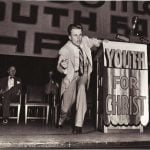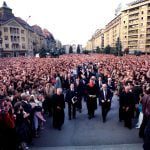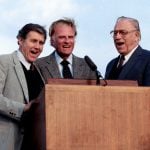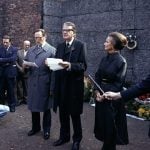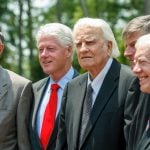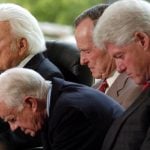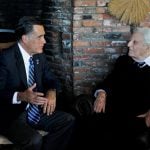ASHEVILLE — Billy Graham, who counseled presidents and preached to millions across the world from his native North Carolina to communist North Korea during his 70 years in the pulpit, died last Wednesday at the age of 99.
Graham’s body lies in honor under the U.S. Capitol rotunda this week as Congress pays tribute to a clergyman who counseled presidents and preached the gospel to millions worldwide. Graham, died at his home in Montreat, near Asheville last week. He will arrive at the white-domed Capitol on Feb. 28 Wednesday and lie in honor there until Thursday.
“Members of the public and Capitol Hill community are invited to pay their respects to the late reverend while he lies in rest,” the speaker of the House of Representatives said.
Graham preached Christianity to more people than anyone else in history during his 70-year career, reaching hundreds of millions of people either in person or via TV and satellite links, his ministry said.
Graham became the de facto White House chaplain to several U.S. presidents, most famously Richard Nixon. He also met with scores of world leaders and was the first noted evangelist to take his message behind the Iron Curtain, the term used for the communist bloc countries of East Europe and the Soviet Union in the decades after World War II.
“He was probably the dominant religious leader of his era,” said William Martin, author of “A Prophet With Honor: The Billy Graham Story.” “No more than one or two popes, perhaps one or two other people, came close to what he achieved.”
In a rare trip away from his home in his later years, Graham had celebrated his 95th birthday on Nov. 7, 2013, at a hotel in Asheville, where some 800 guests, including Donald Trump, business magnate Rupert Murdoch and television hostess Kathie Lee Gifford paid tribute.
The event featured a video of a sermon that his son Franklin said was Graham’s last message to the nation. Graham had been working for a year on the video. In it, he said America was “in great need of a spiritual awakening.”
With his steely features and piercing blue eyes, Graham was a powerful figure when he preached in his prime, roaming the stage and hoisting a Bible as he declared Jesus Christ to be the only solution to humanity’s problems.
“I would study more. I would pray more, travel less, take less speaking engagements. … I took too many of them in too many places around the world. If I had it to do over again I’d spend more time in meditation and prayer and just telling the Lord how much I love him.” Billy Graham, in a 2011 interview.
In his heyday Graham had a thunderous, quick-burst speaking style that earned him the nickname “God’s Machine Gun.” Through his “Crusades for Christ,” Graham sowed fields of devotion across the American heartland that would become fertile ground for the growth of the conservative political movement.
His influence was fueled by an organization that carefully planned his religious campaigns, putting on international conferences and training seminars for evangelical leaders, Martin said.
Graham’s mastery of the media was groundbreaking. In addition to radio and publishing, he used telephone lines, television and satellites to deliver the gospel to homes, churches and theaters around the world.
Some 77 million saw him preach in person while nearly 215 million more watched his crusades on television or through satellite link-ups, a Graham spokeswoman said.
Graham started meeting with presidents during the tenure of Harry Truman. He played golf with Gerald Ford, skinny-dipped in the White House pool with Lyndon Johnson, vacationed with George H.W. Bush and spent the night in the White House on Nixon’s first day in office.
George W. Bush gave Graham credit for helping him rediscover his faith and in 2010, when it was difficult for Graham to travel, Barack Obama made the trip to the preacher’s log cabin home in North Carolina’s Blue Ridge Mountains.
“Their personal lives — some of them — were difficult,” Graham, a registered Democrat, told Time magazine in 2007 of his political acquaintances. “But I loved them all. I admired them all. I knew that they had burdens beyond anything I could ever know or understand.”
In the early half of his career, Graham often spoke his mind on social and political issues of the day, including his strong anti-communist sentiments. But Graham’s politics were not as overt as those of some religious leaders who came after him, such as Pat Robertson and Jerry Falwell.
As he grew older, Graham said he felt he had become too involved in some issues and shifted to a middle-of-the-road position in order to reach more people. He did, however, dive into the gay marriage issue in 2012 when he came out in support of a state amendment to ban same-sex marriages in North Carolina. He also met with Republican Mitt Romney in October 2012 and told him he supported Romney’s run for the presidency.
William Franklin Graham was born on Nov. 7, 1918, into a Presbyterian family and was known as Billy Frank while growing up on a farm near Charlotte. As a teenager, he said he was mostly preoccupied with baseball and girls until he was moved by God after hearing a fiery revivalist in Charlotte.
After attending Bob Jones College, Graham ended up at a Bible school in Florida, where he would preach at his first revival, and was ordained in 1939 by a church in the Southern Baptist Convention. He received a scholarship to Wheaton College near Chicago, where he met Ruth Bell, whose parents were missionaries in China. They married in 1943.
Rather than work from a home church, Graham went on the road, preaching in tents and building a following. His breakthrough came with a 1949 Los Angeles tent crusade that was scheduled for three weeks but extended to eight because of the overflow crowds he attracted.
Graham eventually outgrew tent revivals and would preach at some of the most famous venues in the world, such as Yankee Stadium and Madison Square Garden in New York and London’s Wembley Stadium. He delivered sermons around the globe, including in remote African villages, China, North Korea, the Soviet Union, East Germany, Czechoslovakia and Hungary.
Graham concluded his career of religious campaigns in June 2005 in New York with a three-day stand that attracted more than 230,000 people, his organization said. He turned over his evangelical association to his son Franklin, but his other four children are also evangelists.

